Did you know that more than 80% of behavioral issues in indoor cats stem from boredom or lack of stimulation? Enriching your indoor cat’s life isn’t just a luxury—it’s a necessity for their health and happiness. If you’re eager to prevent destructive behaviors, support your feline friend’s natural instincts, and keep tails flicking with joy, this guide offers practical, easy-to-follow solutions packed with science and heart.
Why Indoor Cat Enrichment Matters: A Startling Look at Feline Wellbeing
“More than 80% of behavioral issues in indoor cats stem from boredom or lack of stimulation.” – Dr. L. Simmons, Feline Behaviorist
- Recent studies link enriched environments to longer, happier lives for indoor cats
- Boredom can lead to obesity, anxiety, and destructive behaviors
Indoor cats may live safer lives than their outdoor counterparts, but their world can be surprisingly small and predictable. Without enough cat enrichment, cats can develop frustrating behaviors like scratching furniture, excessive meowing, or even self-harm. The lack of mental and physical stimulation can have very real health consequences: from obesity and diabetes to anxiety and relationship strain with their humans. Enrichment ideas—like interactive toys, vertical spaces, and puzzle feeders—are more than entertainment; they’re a vital part of supporting your feline friend’s best possible life. By setting up an environment where your cat can safely express their natural instincts, you’re also showing them how much you care.
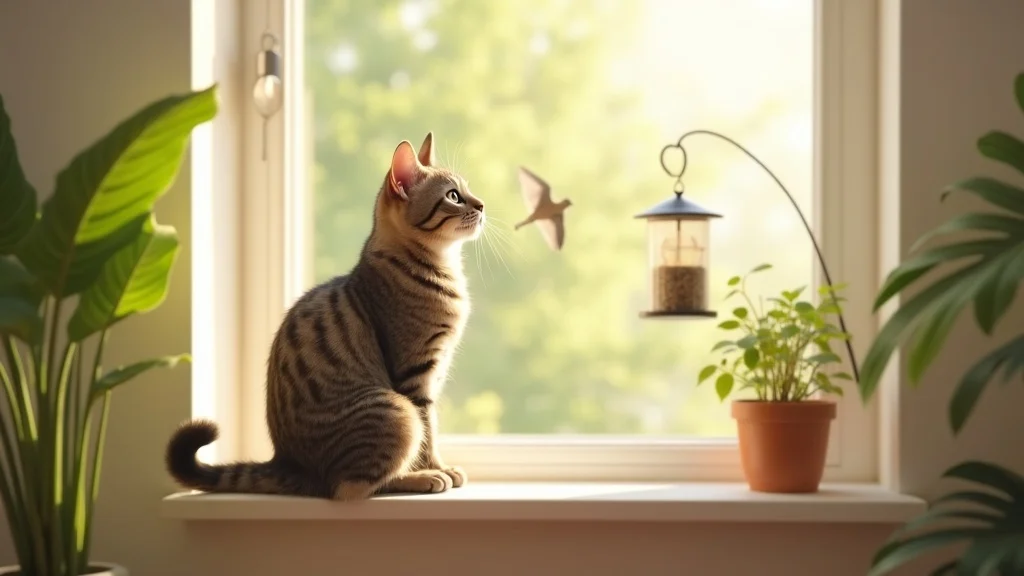
What You’ll Learn: Mastering Cat Enrichment for Indoor Cats
- Identifying and addressing your indoor cat’s basic and advanced enrichment needs
- Top techniques and proven tools for indoor cat enrichment
- How to combine environmental, social, and play-based strategies for a thriving feline
This guide provides developed, practical answers to how do I enrich an indoor cat’s life, building a solid foundation while giving you confidence to experiment. You’ll come away knowing not just what your cat needs, but how to make every day more fun, engaging, and healthy for them. Whether you have a playful kitten or a laid-back senior, you’ll learn how to create the ultimate indoor cat paradise—no matter the space you have.
Understanding the Basics: How Do I Enrich an Indoor Cat's Life?
- What is cat enrichment and why do all indoor cats need it?
- The five pillars of feline enrichment
- Most common mistakes indoor cat owners make (and how to fix them)
Cat enrichment means creating an environment and routine that let your indoor cat express their natural instincts. Unlike their outdoor cousins who climb, hunt, and explore, indoor cats may miss out on vital activities. The five pillars of feline enrichment include: vertical space, interactive play, sensory stimulation, social interaction, and environmental variety. Too many cat owners rely solely on a scratching post or a lone toy—missing out on the varied, changing stimulation cats crave. Recognizing the need for mental and physical engagement is the first step to preventing boredom, stress, or obesity in your feline friend. Start slow, observe which enrichment ideas your cat loves, and focus on consistency rather than extravagance to help your pet truly thrive indoors.
Essential Cat Enrichment Ideas Every Indoor Cat Needs
Creating Stimulating Vertical Space for Enrichment
- Cat trees, shelving, and window perches
- Safe climb zones for indoor cats to survey their domain
One of the most effective ways to enrich an indoor cat’s life is by adding vertical space to your home. Cats love to climb, jump, and observe their territory from above. Multi-level cat trees not only offer exercise, but also a safe, private space for relaxation. Simple additions such as wall-mounted shelves or a soft perch by a sunny window give your feline friend new heights to explore and dominate—fulfilling their natural instinct to climb. Remember to secure each climbing structure properly, especially if you have energetic cats who race from level to level. Swapping perch locations and adding fresh scratching posts every few months will keep exploration fresh and exciting. Providing your cat plenty of options to move up and down helps reduce boredom, builds confidence, and ensures that both shy and curious cats feel at home.
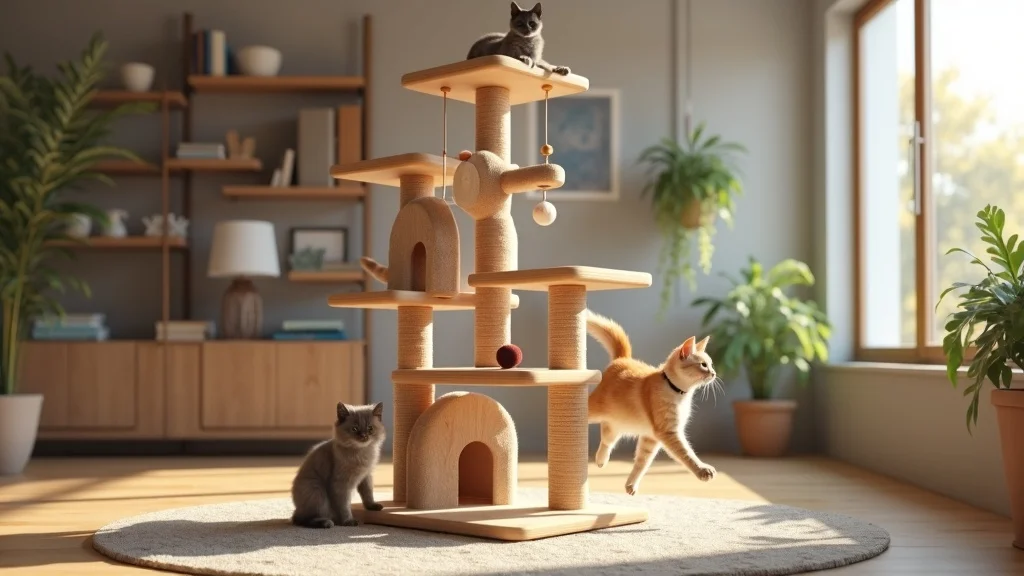
Interactive Cat Toys and Active Play
- Laser pointers, teaser wands, and motorized toys for interactive play
- Rotating and updating cat toy selections to prevent boredom
Active play using interactive toys is crucial to keep minds sharp and bodies healthy. Choose toys that move unpredictably, like motorized mice or laser pointers, to mimic prey and inspire natural hunting behaviors. Teaser wands or feather sticks are perfect for bonding and letting your feline friend express pouncing skills. Rotating toys keeps things interesting—what excites your cat today may bore them tomorrow. Introduce a new toy or change their play environment every week: tuck cat toys into paper bags or cardboard boxes, or hide treats inside an old tissue box for DIY cat hunting fun. A dedicated daily play session with your cat strengthens your bond while helping prevent weight gain, anxiety, and unwanted behavior. The right variety helps your indoor cat stay active, engaged, and mentally sharp.
Puzzle Feeders & Food-Based Cat Enrichment
- Types of puzzle feeders: treat balls, slow feeders, foraging mats
- How puzzle feeders boost problem-solving and reduce overeating
Challenging your cat’s brain during mealtime is a win-win for both you and your pet. Puzzle feeders—from treat-dispensing balls to interactive slow feeders—turn eating into an engaging activity. These tools encourage your indoor cat to problem-solve, bat, and chase for each bite, helping channel natural instincts in a safe, controlled environment. Not only do puzzle feeders provide mental stimulation, but they also reduce the risk of overeating, digestive problems, and boredom when you’re away. Mix in wet food occasionally for added variety, and rotate between different feeder types—like foraging mats or hidden snack cups—to keep meals a fresh adventure. Over time, you’ll notice calm, content energy after feeding, instead of restless pacing or mischief. Food-based enrichment ensures your cat isn’t just well-fed—they’re truly satisfied and involved in their environment.
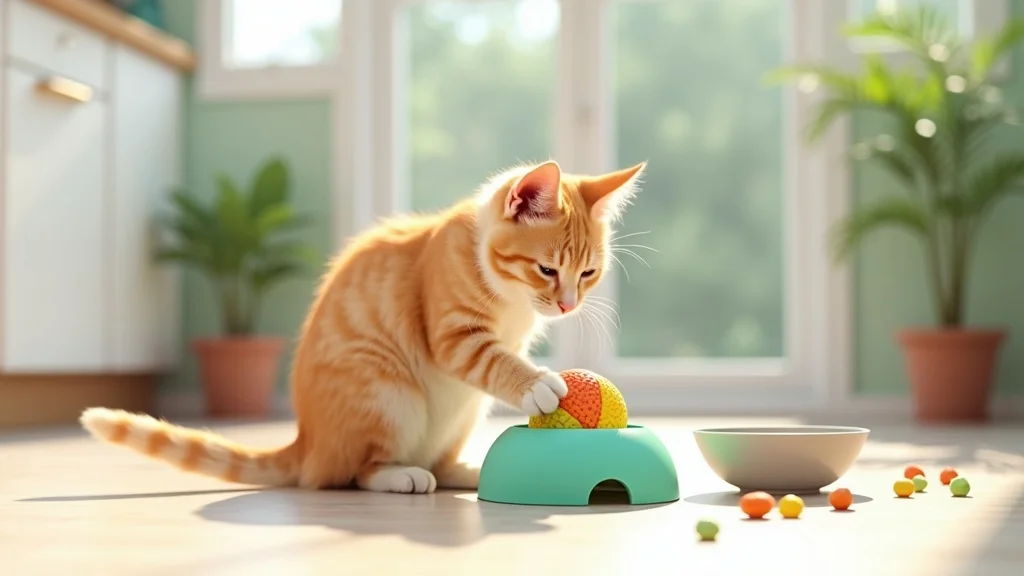
Watch: DIY Cat Enrichment Ideas for Small Apartments
Get inspirations for diy cat projects, from homemade climbing shelves to treat puzzles using everyday objects. These simple ideas make it easy and affordable to add fun and variety to even the smallest indoor spaces.
Environmental Enrichment Ideas: Letting Indoor Cats Discover Their World
- Bird feeders near safe windows (cat TV!)
- Cat-safe houseplants and herb gardens
- Rotating perches and scratching posts
Imagine a cat’s dream world—full of sights, sounds, and textures waiting to be explored. For indoor cats, environmental enrichment brings the excitement of the outdoors inside. Consider placing a bird feeder outside a safe, screened window, creating year-round “cat TV” that satisfies your cat’s hunting curiosity. Grow cat-safe plants like cat grass or catnip indoors to stimulate their senses and support digestion. Try rearranging perches and adding new scratching posts or cardboard box forts to keep the environment dynamic. Cats enjoy exploring new textures and hiding places, so rotating their set-up every month helps prevent boredom. The result? A mentally and physically engaged pet that’s less likely to display problem behaviors. Every small change in your cat’s world provides your feline friend with a fresh burst of curiosity and joy.
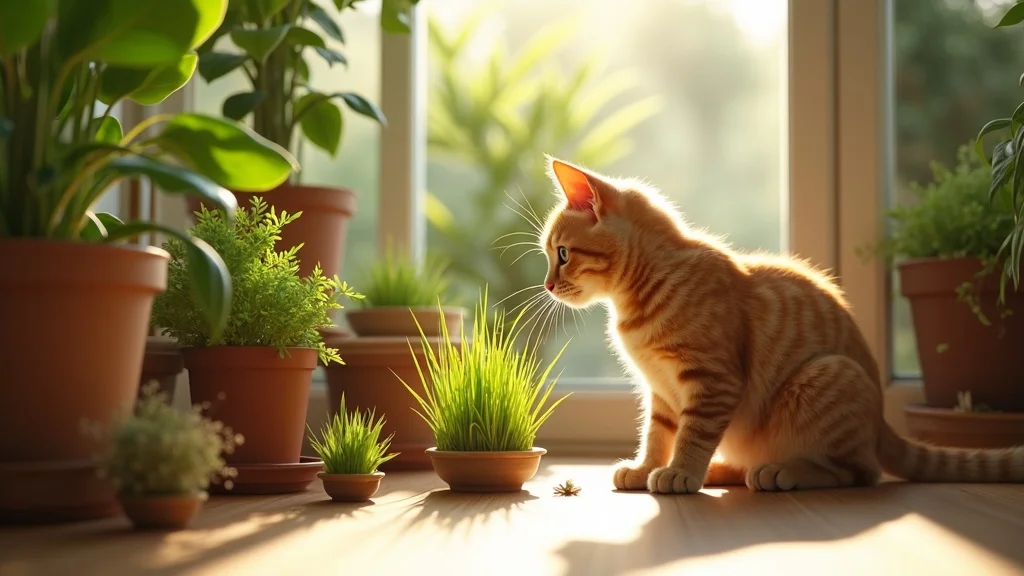
Social Enrichment: Engaging With Your Feline Friend
- The importance of routine playtime
- Training, clicker games, and teaching tricks
- Socialization tips for anxious or shy indoor cats
“Consistent, engaging interaction is as vital for indoor cats as food or shelter.” – Dr. Harper, Veterinary Behavior Expert
Social enrichment means carving out dedicated time every day to interact with your indoor cat. Beyond routine play sessions with interactive toys, you can incorporate clicker training, treat-based games, or even teach your cat simple tricks, which further boosts their confidence. If you have a shy or anxious cat, slow, positive interactions and gentle routines can encourage trust and gradual socialization. For multi-cat homes, ensure each cat has access to quiet, private zones to retreat when needed. Never force interactions; allow your feline friend to approach and set the pace. Over time, cats enjoy routines that foster connection and predictability. Social enrichment doesn’t end with humans—if you have a dog or other pets, introduce new relationships slowly, always prioritizing your cat’s safety and comfort. These daily bonds are essential for a balanced, stress-free life indoors.
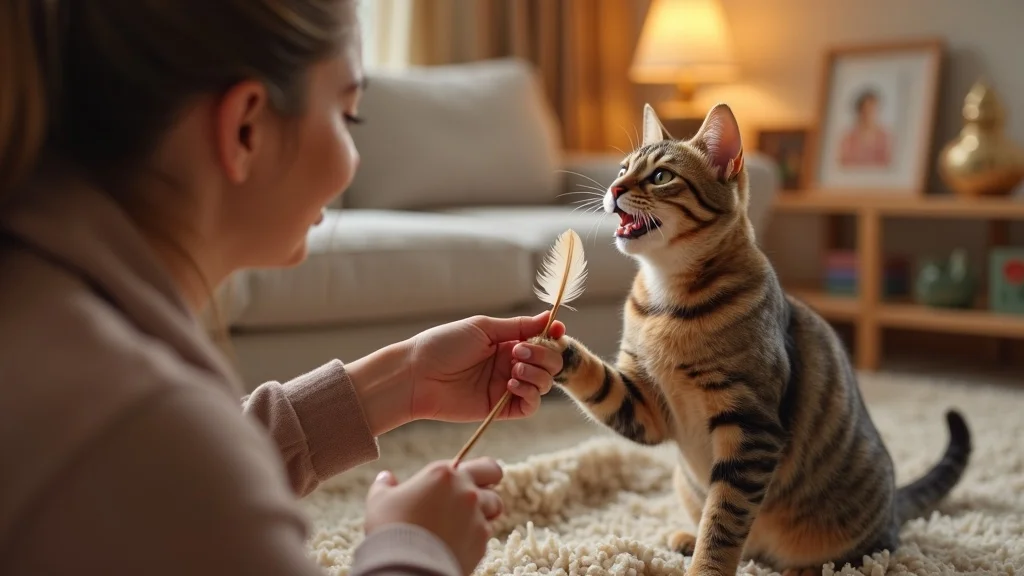
Seasonal and Sensory Cat Enrichment for Indoor Cats
- Scent swaps and catnip sessions
- Seasonal themes: boxes, paper bags, and holiday-themed play
- Incorporating new textures and sounds
The changing seasons offer creative new ways to keep enrichment interesting for indoor cats. During holidays, add festively wrapped cardboard boxes and paper bags for playful exploring or safe hiding spots. Scent swaps—such as bringing in a stick from the garden or using a small cat-safe herb sachet—spark curiosity and let your cat satisfy their sense of smell. Rotate sensory toys that crinkle, rattle, or move, and sprinkle catnip for a burst of playful energy. Even switching up their bedding with different textures or cozy pillows makes a big difference. Remember, enrichment is not a one-time fix—it’s a series of thoughtful changes that keep your feline friend environmentally and emotionally satisfied as their world (and yours) evolves.
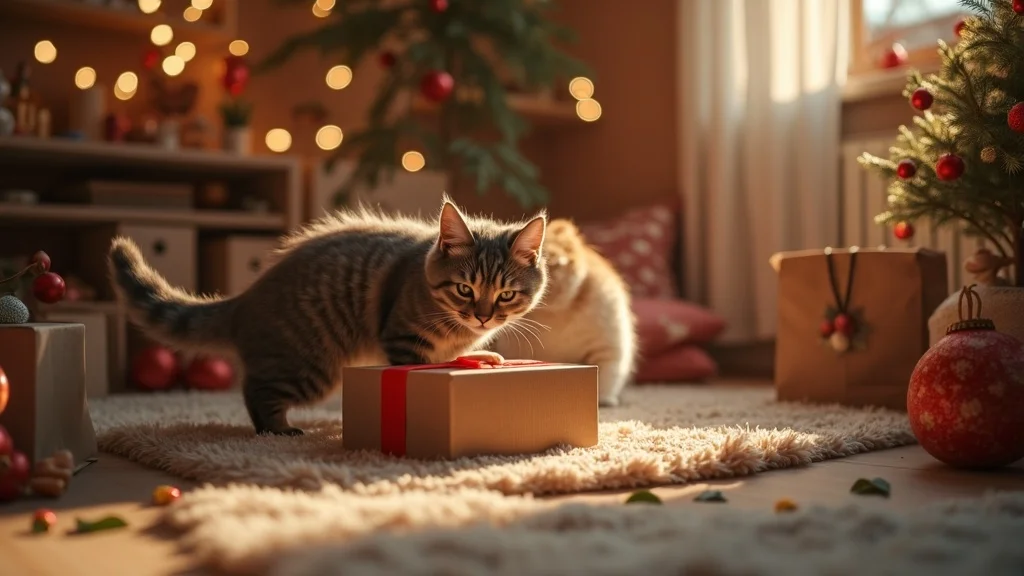
Busy schedule? Watch proven, low-maintenance strategies to keep your indoor cat happy with minimal daily effort. Packed with easy routines and products you can start today.
Tables: Comparing Top Indoor Cat Enrichment Products
| Product | Type | Features | Benefits | Estimated Price |
|---|---|---|---|---|
| Armarkat Cat Tree | Vertical Space | Multi-level, cozy perches, built-in scratching posts | Exercise, climbing, secure hiding & sunbathing | $75-$120 |
| Petstages Cat Tracks | Interactive Toy | Multi-ball chase game, sturdy base, non-slip pads | Mental stimulation, solo play, encourages pouncing | $15-$25 |
| Cat Amazing Puzzle Feeder | Puzzle Feeder | Adjustable difficulty, eco-friendly cardboard, treat dispenser | Slows eating, boosts mental challenge, DIY refillable | $20-$30 |
| Jackson Galaxy Butterfly Ball | Interactive Toy | Battery-powered, realistic fluttering action | Triggers prey drive, boosts active play, suitable for all ages | $18-$30 |
| PetSafe SlimCat | Puzzle Feeder | Durable ball design, adjustable food holes | Weight management, meal-time engagement | $8-$12 |
Common Mistakes to Avoid in Cat Enrichment
- Overwhelming your indoor cat with too many changes
- Neglecting the need for quiet/safe retreat zones
- Ignoring signs of stress or overstimulation in enrichment routines
While enrichment is key to a happy indoor cat, it’s possible to do too much, too quickly. Introducing a bunch of new cat toys, feeders, and scratching posts all at once can overwhelm your pet and trigger anxiety. Always let your feline friend set the pace for exploration, introducing one new experience at a time. Don’t forget that every cat needs a private retreat—somewhere they can hide or relax when they’re tired. If your cat is suddenly hiding more, hissing, or seems stressed by new items, scale back and offer more comfort. Successful cat enrichment is not about how many products you provide, but how closely you observe and adapt to your cat’s unique preferences and comfort levels.
People Also Ask: Cat Enrichment & Indoor Cat Wellbeing
How do I improve my indoor cat's life?
- Offer daily playtime and interactive toys, provide multiple vertical and scratching spaces, and rotate enrichment items regularly.
Improving your indoor cat’s life starts with understanding their need for variety and stimulation. Create higher perches with cat trees or shelves, rotate cat toys to keep novelty fresh, and invest in interactive play sessions daily. Simple changes—like swapping new scratching posts or hiding treats—boost both physical and mental engagement.
What is the 3-3-3 rule for cats?
- The 3-3-3 rule describes the adjustment period for newly adopted cats: 3 days to decompress, 3 weeks to settle in, and 3 months to fully bond.
This rule helps new cat parents know what to expect as their feline friend adjusts to a new home. The first 3 days can be overwhelming, so gentle routine and safe spaces are important. By 3 weeks, most indoor cats start to relax and explore, and by 3 months, you’ll see your pet’s full personality shine as they bond with you and your family.
What is considered poor quality of life for a cat?
- Lethargy, aggression, hiding, overeating/undereating, and lack of interest in toys or social interaction may signal poor quality of life.
Monitor for changes in appetite, energy levels, or hiding behaviors—especially if your cat used to enjoy active play, toys, or exploration. Ongoing disinterest in food, grooming, or interaction often signals stress or underlying health issues. Prompt veterinary care—and more personalized enrichment—can help restore their spark.
How do you make indoor cat enrichment?
- Combine environmental upgrades (cat trees, shelves), foraging and feeding puzzles, social play, and rotation of toys to keep things fresh and interesting.
Effective enrichment mixes various elements: climbing and hiding areas, rotating puzzle feeders, interactive toys, and daily hands-on play. Aim for both mental and physical stimulation, observe how your indoor cat reacts, and adjust strategies regularly to keep each day exciting and joyful.
Top 10 Cat Enrichment Ideas: List for Every Indoor Cat Parent
- Install a multi-level cat tree
- Set up a bird feeder outside a safe window
- Swap in new interactive toys weekly
- Try food puzzles and treat balls
- Schedule daily play sessions
- Add cat-friendly plants to your home
- Teach fun tricks using clicker training
- Use tunnels and boxes for hide & seek
- Rotate scratching posts and perches
- Offer safe outdoor time with a catio or harness
These expert-approved strategies cover the full spectrum of cat enrichment, ensuring your cat can climb, pounce, explore, and rest with confidence. Even a small change can spark a big difference in your cat’s daily outlook.
FAQs: How Do I Enrich an Indoor Cat's Life?
-
How many hours of play do cats need daily?
Most indoor cats benefit from at least two 15-20 minute active play sessions per day for optimal health and happiness. -
Can older indoor cats enjoy enrichment activities?
Absolutely! Adapt play and enrichment tools to match their mobility, focusing on mental games, gentle climbing options, and scent-based puzzles. -
What's the best way to introduce new enrichment tools?
Start with one new item at a time; pair it with treats or interactive play. Give your cat time to inspect and get comfortable before introducing more changes.
Key Takeaways for How Do I Enrich an Indoor Cat's Life
- Enrichment is essential to prevent boredom and behavioral issues in indoor cats
- Mix physical, mental, and social stimulation daily
- Start simple, observe your cat's preferences, and adjust accordingly
Ready to Take Your Indoor Cat's Life to the Next Level?
- Your pet deserves the best. Let us help! Our monthly newsletter is packed with tips, treats, and tools to keep tails wagging and whiskers twitching. 🐾 Subscribe today — because you're their favorite human.
The journey to a happier indoor cat starts today—embrace small changes, stay curious, and watch your feline friend flourish.
To further enhance your indoor cat’s environment and well-being, consider exploring these valuable resources:
- “On the Prowl for Adventure: 7 Ways to Enrich Your Indoor Cat’s Life” (vetstreet.com)
This article offers practical strategies to stimulate your cat’s mind and body, including interactive play and environmental modifications.
- “Cat Behavior and Training - Enrichment for Indoor Cats” (vcahospitals.com)
This resource provides insights into creating a stimulating indoor environment, emphasizing the importance of vertical spaces and interactive toys.
By incorporating the techniques and ideas from these resources, you can create a more engaging and fulfilling environment for your indoor cat, promoting their overall health and happiness.
 Add Row
Add Row  Add
Add 




Write A Comment